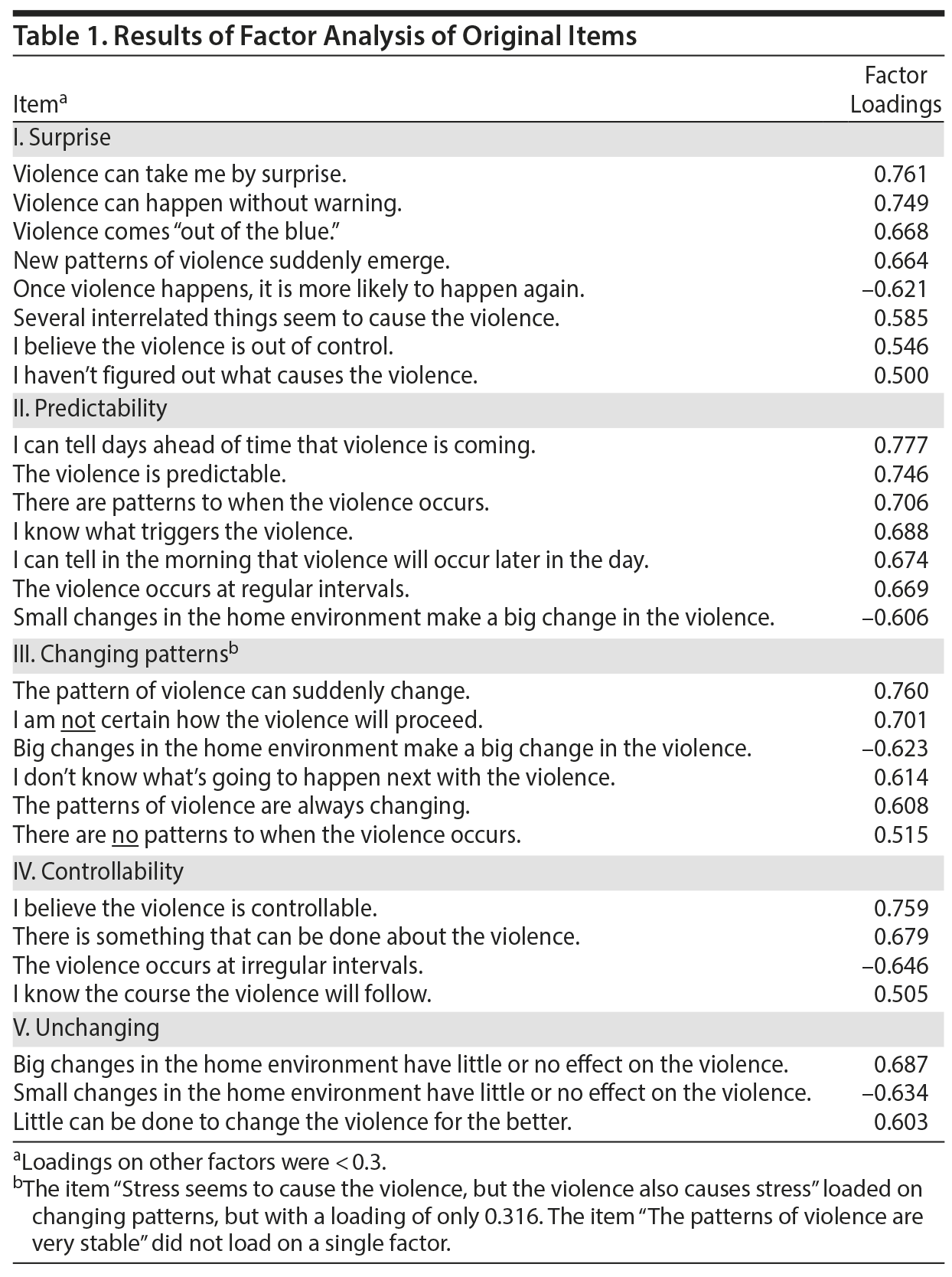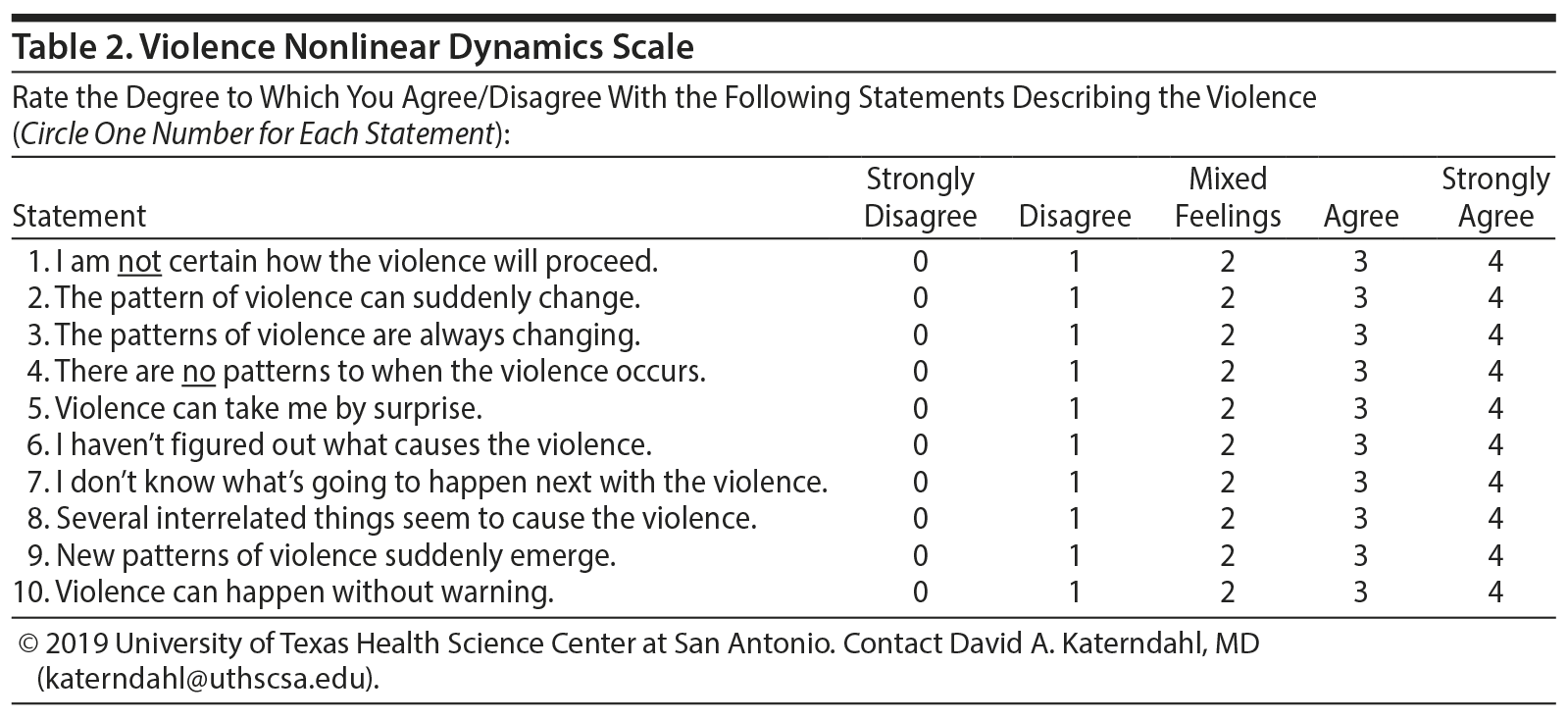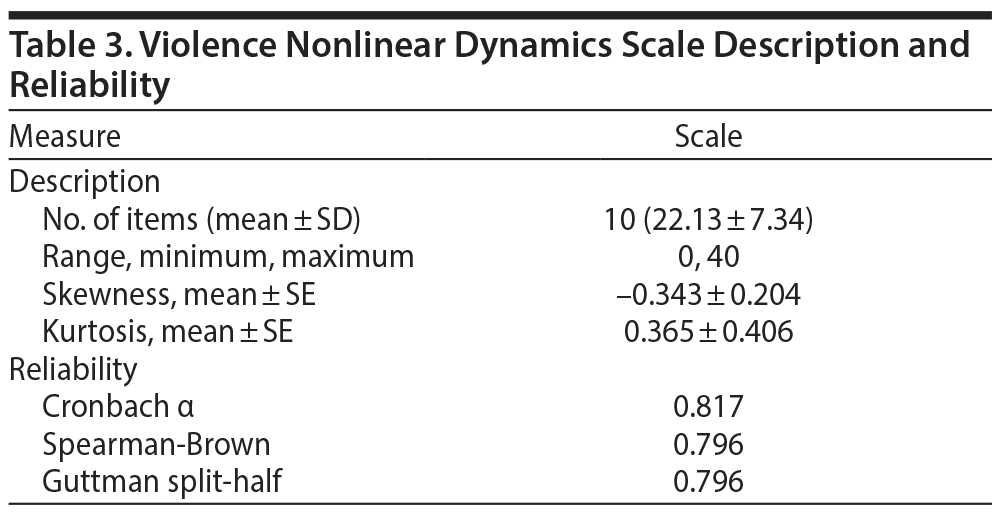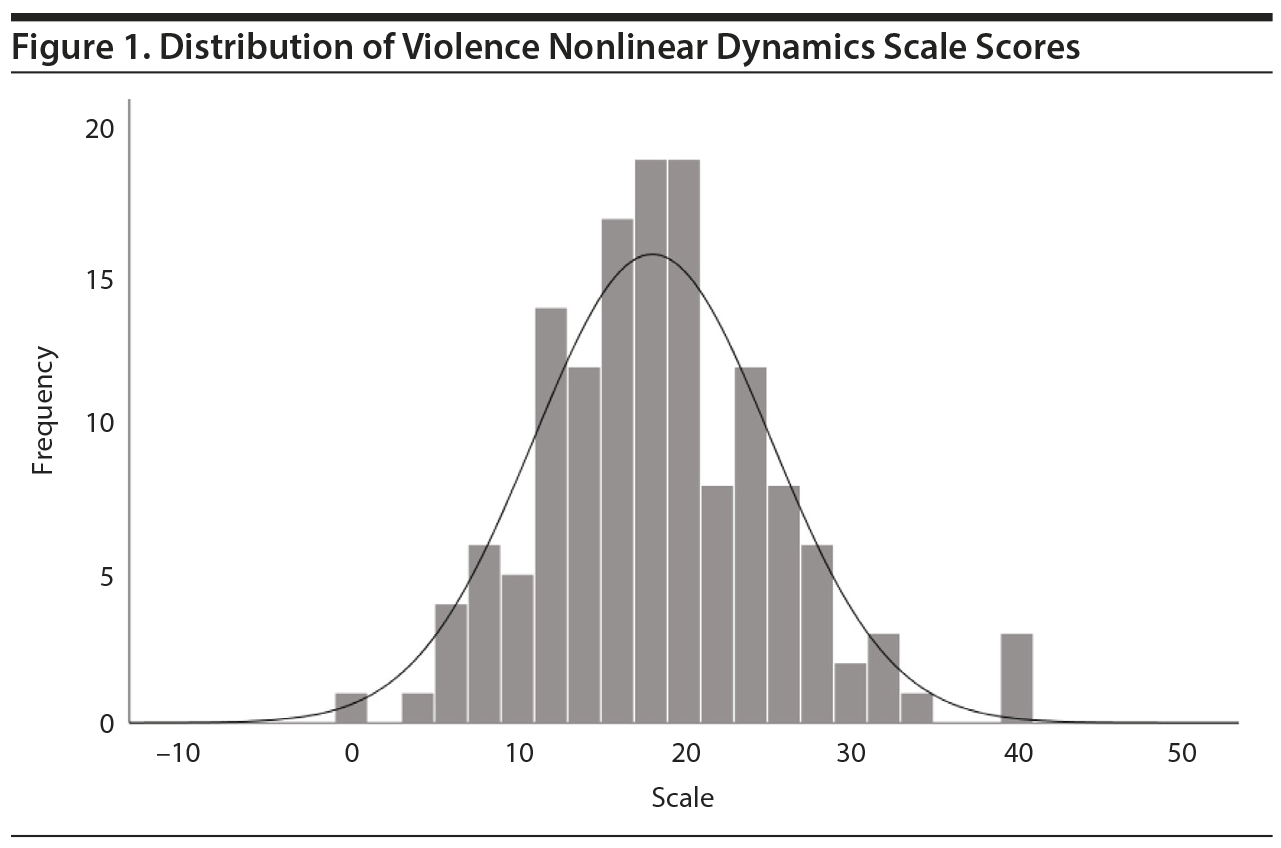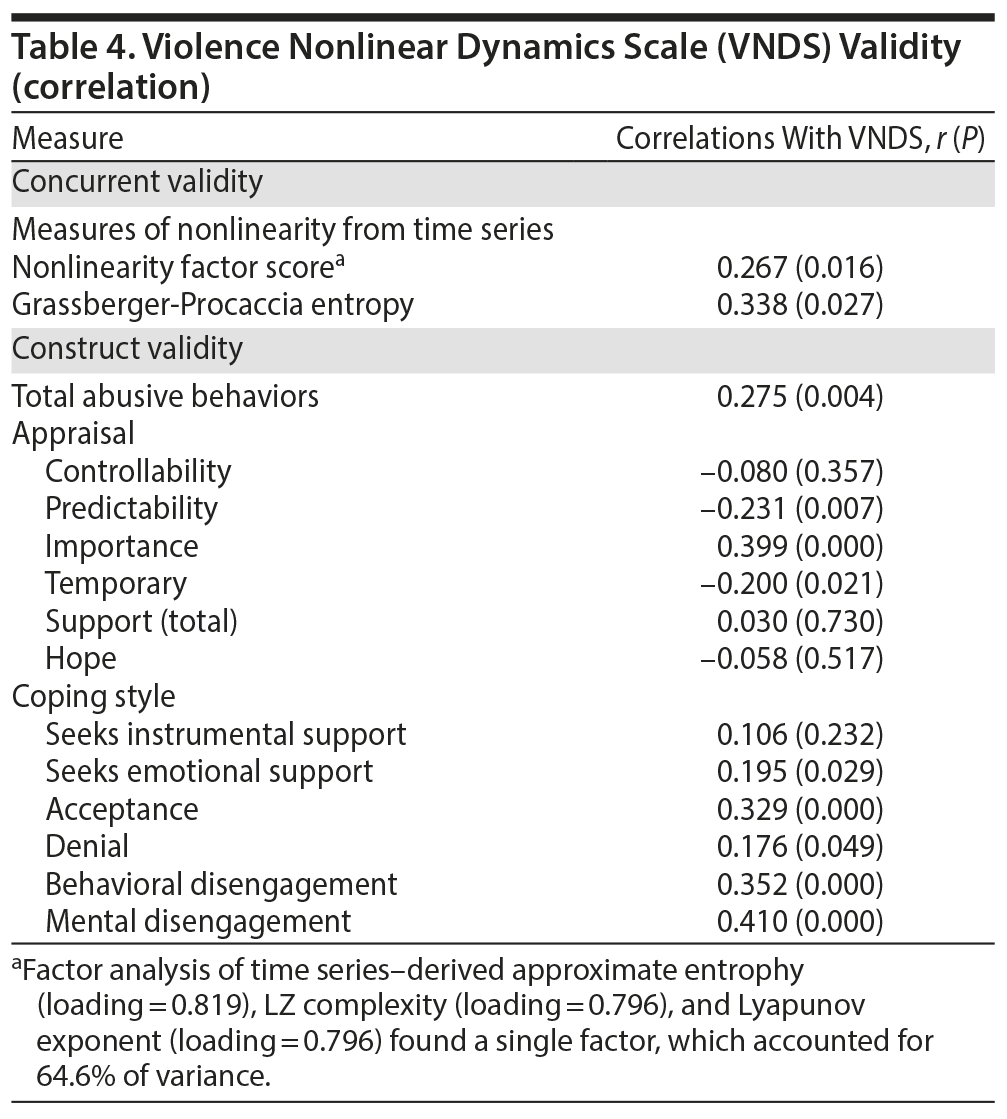Objective: The trajectory of daily partner violence generally demonstrates nonlinear dynamics, and this nonlinearity is important to patient outcomes, as it is sometimes a stronger predictor of outcomes than violence frequency or severity. However, measurement of such dynamics is difficult, requiring complete time series data of sufficient length to yield stable measures. The purpose of this study was to develop a pencil-and-paper instrument to estimate violence nonlinearity and assess its psychometrics.
Methods: Adult women (N = 143) who experienced violence in the previous month were enrolled from 6 primary care clinics. Baseline surveys assessed factors known to correlate with nonlinearity (partner’s control strategies, violence appraisal, hope, social support, coping style) and violence dynamics using a 30-item instrument based on traditional characteristics of complex adaptive systems. Participants completed daily assessments of the previous day’s violence using interactive voice response via telephone for 8 weeks, with data collection occurring between August 2013 and March 2015. Three different measures of nonlinearity were computed: LZ complexity (algorithmic complexity), approximate entropy (lack of regularity), and Lyapunov exponent (sensitivity to initial conditions).
Results: Using factor analysis and reliability measures, the final 10-item Violence Nonlinearity Dynamics Scale (VNDS) was identified. The VNDS was found to have both internal consistency (0.817) and split-half reliability (0.796). In addition, the instrument demonstrated concurrent (correlating with both the combined nonlinearity factor score [r = 0.267] and Grassberger-Procaccia entropy [r = 0.338]) and construct (correlating with 9 of 13 previously identified nonlinearity correlates) validity.
Conclusions: The VNDS has both reliability and validity and could facilitate the inclusion of nonlinearity assessment in both intimate partner violence research and clinical work.
ABSTRACT
Objective: The trajectory of daily partner violence generally demonstrates nonlinear dynamics, and this nonlinearity is important to patient outcomes, as it is sometimes a stronger predictor of outcomes than violence frequency or severity. However, measurement of such dynamics is difficult, requiring complete time series data of sufficient length to yield stable measures. The purpose of this study was to develop a pencil-and-paper instrument to estimate violence nonlinearity and assess its psychometrics.
Methods: Adult women (N = 143) who experienced violence in the previous month were enrolled from 6 primary care clinics. Baseline surveys assessed factors known to correlate with nonlinearity (partner’s control strategies, violence appraisal, hope, social support, coping style) and violence dynamics using a 30-item instrument based on traditional characteristics of complex adaptive systems. Participants completed daily assessments of the previous day’s violence using interactive voice response via telephone for 8 weeks, with data collection occurring between August 2013 and March 2015. Three different measures of nonlinearity were computed: LZ complexity (algorithmic complexity), approximate entropy (lack of regularity), and Lyapunov exponent (sensitivity to initial conditions).
Results: Using factor analysis and reliability measures, the final 10-item Violence Nonlinearity Dynamics Scale (VNDS) was identified. The VNDS was found to have both internal consistency (0.817) and split-half reliability (0.796). In addition, the instrument demonstrated concurrent (correlating with both the combined nonlinearity factor score [r = 0.267] and Grassberger-Procaccia entropy [r = 0.338]) and construct (correlating with 9 of 13 previously identified nonlinearity correlates) validity.
Conclusions: The VNDS has both reliability and validity and could facilitate the inclusion of nonlinearity assessment in both intimate partner violence research and clinical work.
Prim Care Companion CNS Disord 2019;21(2):18m02404
To cite: Katerndahl DA, Burge SK, Ferrer RL, et al. Psychometrics of the Violence Nonlinear Dynamics Scale. Prim Care Companion CNS Disord. 2019;21(2):18m02404.
To share: https://doi.org/10.4088/PCC.18m02404
© Copyright 2019 Physicians Postgraduate Press, Inc.
aFamily and Community Medicine, University of Texas Health Science Center, San Antonio, Texas
*Corresponding author: David A. Katerndahl, MD, Family and Community Medicine, University of Texas Health Science Center, 7703 Floyd Curl Dr, San Antonio, TX 78229-3900 ([email protected]).
More than a third of American women will experience intimate partner violence (IPV) or stalking during their lifetime.1 In addition to physical injury and increased health care utilization,2-5 these victims are at increased risk for the development of mental disorders.3,4,6,7 While the frequency and severity of the violence are important characteristic predictors of outcomes, the dynamics of the violence is also an independent predictor.
Men’s violence against women is generally nonlinear (unpredictable),8-10 and the degree of nonlinearity is important to women’s health and mental health outcomes. Nonlinear phenomena are characterized by irregular trajectories, dynamic and variable relationships, and a disproportional response to interventions, leading to unexpected events and changing patterns. Violence nonlinearity is a significant predictor of women’s negative coping strategies (ie, denial, disengagement), positive violence appraisals (ie, controllable, temporary), and hope and support and can be a stronger predictor of outcomes than violence frequency or severity. In addition, there is a curvilinear relationship between violence nonlinearity and symptoms, function, and readiness for change in which midrange nonlinearity is most strongly associated with positive outcomes.11 In qualitative research, leaving a violent relationship seems to be a nonlinear process.12,13 Quantitatively, the reason may be due to the link between a nonlinear pattern of violence and a nonlinear assessment of the need to leave.10 Despite the importance of assessing violence nonlinearity, measurement of such dynamics is difficult.
Computation of nonlinearity measures involves cognitive, computational, temporal, and physical resources.14 Measurement of nonlinearity of a phenomenon requires complete time series data of sufficient length to yield stable measures. It is a challenge to obtain repeated psychological measures from subjects over a long period of time due to cost and incomplete responses. Also, most methods of imputing missing time series data assume linearity, which is at odds with a nonlinear measure. Finally, previous guidelines15 mandated many datapoints for dynamical assessment. Thus, using the assessment of violence nonlinearity in clinical or research settings is challenging and costly.
The application of such nonlinearity assessment to the social sciences must be doable in terms of sample size and time series length.16 With such obstacles, the development of a simple, pencil-and-paper instrument that accurately estimates nonlinearity would be a significant advancement, especially in the study of IPV. The purpose of this study was to develop a pencil-and-paper instrument to estimate violence nonlinearity and assess its psychometrics.
METHODS
Sample
Using methods similar to those of a prior study,17 women with a recent history of husband-to-wife physical abuse were recruited from 6 primary care clinics in San Antonio, Texas. Researchers screened nonpregnant female patients aged 18-64 years in the examination room while they waited to see their physician. If husbands accompanied them, they were not screened. If they had experienced violence from their partner in the past 30 days, based on responses to a 6-item brief Conflict Tactics Scale,18 they next responded to a Danger Assessment Screen.19 Women in severely dangerous relationships were excluded from the study and referred to the Family Justice Center, a city-supported victim assistance program. To ensure that the women remained safe during the study, a researcher spoke on the phone with them weekly to assess their ongoing safety. This study was approved by the Institutional Review Board at the University of Texas Health Science Center at San Antonio.

- When violence dynamics are linear and predictable, targeted interventions are more likely to have predictable effects.
- When violence dynamics are nonlinear, intervention cannot be expected to yield predictable results, suggesting that providing global support and access to resources may be the best option.
Procedure
One hundred forty-three participants enrolled and completed measures addressing background characteristics at baseline in a confidential setting. In addition to demographics, we assessed control strategies used by their partner with the 17-item Abusive Behavior Inventory.20 Appraisal of the violent situation (eg, controllability, predictability) was assessed using the 24-item, 6-scale Appraisal Dimension Scale21 directed at a primary stressor (violence); 4 scales were used for this analysis. Hope was measured using the 12-item Herth Hope Index.22 Social support was measured using the 22-item Duke Social Support and Stress Scale.23 Coping style was assessed with the 53-item COPE Inventory,24 which has twelve 4-item subscales measuring active versus avoidant coping mechanisms. Five scales measure problem-focused coping (active coping, planning, acceptance, reinterpretation and growth, turning to religion), 4 scales measure emotion-focused coping (seeking support for instrumental reasons, seeking support for emotional reasons, behavioral disengagement, mental disengagement), and 3 scales measure maladaptive coping (denial, restraint coping, suppression of competing). Six scales that have previously correlated with nonlinearity of violence were used for this analysis (acceptance, denial, seeking support for instrumental reasons, seeking support for emotional reasons, behavioral disengagement, mental disengagement).24
Questions concerning violence dynamics, completed at baseline, were developed to provide a self-reported pencil-and-paper estimate of violence nonlinearity. On the basis of traditional descriptors of complex adaptive systems, researchers constructed a 30-item instrument to assess dynamic patterns and changeability; multiple, interdependent, or circularly causal factors; violence unpredictability or uncontrollability; violence response disproportionality; and absence of attractors (stable basins limiting the range of values). Items were randomly ordered and rated on a 5-point Likert scale.
In addition to baseline measurements, participants completed a daily assessment using interactive voice response via telephone for 8 weeks. About the same time each day, participants called the interactive voice response from a safe location and answered questions concerning the previous day’s experience with violence, personal feelings, and home environment. The daily assessment of husband-to-wife violence severity was measured by a modified Conflict Tactics Scale,18 and data collection occurred between August 2013 and March 2015.
Analysis
Analysis was limited to English-speaking subjects. To identify a reliable and valid nonlinearity scale from these 30 items, we employed factor analysis using principal component analysis with promax rotation to maximize factor identification without concern for orthogonal independence; factor loadings ≥ 0.5 were deemed significant. Table 1 presents the 5 factors that resulted with their factor loadings. Items from the 2 factors that best reflect nonlinearity (surprise and changing patterns) were combined, and reliability analysis was conducted; 4 items were then removed to maximize Cronbach α. The resulting Violence Nonlinear Dynamics Scale (VNDS) consisted of the 10 items presented in Table 2.
Computing nonlinearity from daily reports. To compute nonlinearity measures, complete time series data are needed. To impute missing data in daily violence level while retaining their nonlinearity, we applied the nstep procedure from the TISEAN nonlinear Time Series Analysis package.15 The nstep approach to imputation has been shown to least distort nonlinear characteristics of time series when compared to traditional imputation methods.25 Unlike other approaches to handling missing data, nstep successfully corrected for 25%-60% of missing data if such data were missing at random, 15%-40% if missing data followed a power distribution in chaotic time series, and 40% when data were missing randomly and 25% when data were missing according to a power law in periodic time series.26 When the initial datapoints in the time series were insufficient to apply nstep (generally < 4), the mode of the time series was inserted until the time series was long enough to use nstep. To assess the effects of data imputation of nonlinearity assessment, we compared nonlinearity measures using all datasets (n = 93) compared with those using only complete, nonimputed datasets (n = 11) and those with less than 25% of data missing (n = 63). Although both measures of nonlinearity increased as use of imputed data increased, the incremental changes were small for both measures.
Study completers completed reports on an average of 41.81 (74.66%) days. Three types of nonlinearity exist,27 and we selected 1 measure from each type for this study, with higher coefficients suggesting greater degrees of nonlinearity. (1) Algorithmic complexity (a measure of the amount of information needed to describe the data) was measured by LZ complexity.28 (2) Regularity (or the lack of it) was measured by approximate entropy (ApEn).29 (3) Sensitivity to initial conditions (speed with which 2 adjacent points diverge over time) was measured with the largest Lyapunov’s exponent.30 Because our intent was to develop a measure of overall nonlinearity not limited by type, factor analysis using principal component analysis with promax rotation was employed with these 3 nonlinearity measures to derive an overarching nonlinearity factor score. In addition, fractal dimensionality (related to system complexity) was estimated using the Grassberger-Procaccia algorithm.31 These measures were computed using the Chaos Data Analyzer software.32 (See the Supplementary Appendix for terminology description.)
Psychometric assessment. Psychometric assessment consisted of estimation of reliability using Cronbach α assessment of internal consistency and both Spearman-Brown and Guttman split-half reliability. Validity was assessed in 2 ways. We assessed concurrent validity by correlating instrument-derived nonlinearity as the sum of the 10 item scores with actual measures of nonlinearity and fractal dimensionality derived from daily assessment of violence severity. Construct validity was assessed via correlation with previously derived correlates of violence nonlinearity.11 These correlates included appraisals of the violence (predictability, importance, temporary nature), husbands’ use of control strategies (total control strategy use), hope (total hope level) and support received (total support), and both support-based coping (instrumental and emotional support) and negative coping (acceptance, denial, behavioral, and mental disengagement). A P value ≤ .05 was deemed significant.
RESULTS
Although 143 women enrolled in the study, this analysis includes only the 120 English-speaking women. These women included 94 (79%) Hispanics, and 80 (68%) had at least a high school education. Economically, 62 (56%) reported a household income < $20,000 annually, and 108 (96%) were in socioeconomic class III-V.33 The mean ± SD age of the women was 44.8 ± 10.0 years, and 1.43 ± 1.54 children lived at home. The mean ± SD duration of the relationship was 13.8 ± 12.1 years, while the duration of violence was 9.7 ± 10.8 years.
Table 3 presents the characteristics of the VNDS in this sample. While the complete range of possible scores (0-40) was found (Figure 1), the kurtosis was positive. Nonlinearity was skewed to the right, as seen in prior studies of nonlinearity of violence,8,9 but measured skewness was not significantly different from normality (mean was less than twice its SE). Table 4 also presents measures of both internal consistency and split-half reliability. In both cases, reliability was around 0.80.
Table 4 summarizes assessment of instrument validity. Because 3 different types of nonlinearity exist, assessment of VNDS nonlinearity was tested against a combined measure of these 3 types derived as the factor scores of the LZ complexity, ApEn, and Lyapunov exponent computed from the violence time series. Concurrent validity was assessed by correlating the VNDS score with this nonlinearity factor score (r = 0.267, P = .016). As confirmation, when the factor analysis was rerun, including the VNDS score, all 4 measures factored together, accounting for 51% of the variance. In addition, a further measure of concurrent validity was the correlation between the VNDS score and the Grassberger-Procaccia measure of fractal dimensionality computed from the violence time series (r = 0.338, P = .027).
To assess construct validity, we correlated the VNDS with previously observed correlates of violence nonlinearity.11 As Table 4 shows, 9 of 13 correlations were significant, including appraisal of unpredictability, a theoretical hallmark of nonlinearity.
DISCUSSION
This 10-item instrument demonstrates strong internal consistency. In addition, when compared to other measures of nonlinearity derived from a violence time series, the scale showed modest concurrent validity. Finally, in addition to correlating with appraisal of unpredictability as expected in nonlinearity, the scale demonstrated construct validity as well. However, ongoing validation work is needed. Future studies using larger samples should determine the instrument’s validity among non-Hispanic white subjects, seek evidence of predictive validity, and test its applicability and clinical value in primary care settings among clinicians.
The availability of a pencil-and-paper, self-report measure of violence nonlinearity would represent a significant development for IPV research. Currently, assessment of nonlinearity of violence requires extensive temporal data collection with imputation of missing values, limiting the inclusion of this measure in IPV research. Measurement of violence nonlinearity would deepen our understanding of the impact of IPV dynamics.
This instrument may have clinical applications as well. Previous analyses10 suggest that the process of leaving a violent relationship is nonlinear because it is closely linked to the unpredictability of violence itself. If this theory bears out, then having a simple tool to assess violence nonlinearity may assist providers in helping women to manage this leaving process. When violence dynamics are linear (or predictable), then targeted interventions are more likely to have predictable effects. When violence dynamics are nonlinear, then intervention cannot be expected to yield predictable results. In such cases, providing global support and access to resources may be the best option.
Finally, the development of a simple, pencil-and-paper, self-report instrument to assess nonlinearity of violence may have implications beyond IPV research. Just as the Appraisal Dimension Scales21 can be used to assess 6 different appraisals of any construct, so too may the VNDS scale be the first step in the development of such a tool to assess nonlinearity of other constructs. If so, then nonlinearity of dynamics may become a routine construct in social science research.
Limitations
This study has several limitations. First, the sample size is small for a time series analysis. However, previous studies suggest that stable measures of ApEn34 and LZ complexity35 can be obtained with as few as 50 and 30 datapoints, respectively. Although women were asked to make daily reports at the same time each day and women generally said that they did, we cannot verify this. Potentially, reporting at different times could affect the accuracy of the reports and, hence, the overall nonlinearity measurement. In addition, the predominance of Hispanics within the sample may limit the generalizability of the findings. Not only can ethnicity and culture affect perceived “acceptability” of violence36 and prevalence of IPV,37 but Hispanics may also be particularly “unrepresentative” of women in violent relationships. While living in extended families may be protective against violence38 and familismo may increase the seeking of informal help,39 the high prevalence of social isolation among Hispanics and those of low socioeconomic status may increase the risk of IPV.40 However, Ingram41 found that, while Latinas reported increased rates of IPV in the prior year, their lifetime rates were lower than those of non-Hispanic whites. Because Lyapunov exponents require many datapoints for stability, sensitivity analyses conducted assessed differences in LZ complexity, ApEn’s , and VNDS scores, comparing Hispanics versus non-Hispanics, women ≤ 45 years old versus those > 45 years old, and women experiencing IPV for ≤ 5 years versus > 5 years. While no significant differences in LZ complexity, ApEn, and VNDS were observed (see the Supplementary Appendix), correlations between VNDS and nonlinearity factor score only reached statistical significance for Hispanics, women > 45 years old, and those experiencing IPV for ≤ 5 years, suggesting that the VNDS may be most appropriate for those subgroups.
CONCLUSION
The VNDS represents a 10-item self-report measure of the degree of nonlinearity of daily IPV. In addition to good descriptive characteristics, this scale has demonstrated internal consistency and split-half reliability as well as concurrent and construct validity. This instrument needs further validation in diverse samples as well as clinical utility studies. The development of this instrument could facilitate the inclusion of nonlinearity assessment in both IPV research and clinical work.
Submitted: October 26, 2018; accepted January 18, 2019.
Published online: April 4, 2019.
Potential conflicts of interest: None.
Funding/support: This project was funded by a grant from the National Science Foundation (no. 1260210).
Role of the sponsor: The funding agency had no role in the design, conduct, data collection, analysis, interpretation, or review of the study or approval of any manuscripts.
Supplementary material: See accompanying pages.
REFERENCES
1. Black MC, Basile KC, Breiding MJ, et al. The National Intimate Partner and Sexual Violence Survey (NISVS): 2010 Summary Report. Atlanta, GA: National Center for Injury Prevention and Control, Centers for Disease Control and Prevention; 2011.
2. Tjaden P, Thoennes N. Extent, Nature, and Consequences of Intimate Partner Violence. Grant no. 93-IJ-CX-0012. Washington, DC: National Institute of Justice and Centers for Disease Control; 2000.
3. McCauley J, Kern DE, Kolodner K, et al. The “battering syndrome”: prevalence and clinical characteristics of domestic violence in primary care internal medicine practices. Ann Intern Med. 1995;123(10):737-746. PubMed CrossRef
4. Roberts GL, Williams GM, Lawrence JM, et al. How does domestic violence affect women’s mental health? Women Health. 1998;28(1):117-129. PubMed CrossRef
5. Wisner CL, Gilmer TP, Saltzman LE, et al. Intimate partner violence against women: do victims cost health plans more? J Fam Pract. 1999;48(6):439-443. PubMed
6. Coker AL, Smith PH, Bethea L, et al. Physical health consequences of physical and psychological intimate partner violence. Arch Fam Med. 2000;9(5):451-457. PubMed CrossRef
7. Danielson KK, Moffitt TE, Caspi A, et al. Comorbidity between abuse of an adult and DSM-III-R mental disorders: evidence from an epidemiological study. Am J Psychiatry. 1998;155(1):131-133. PubMed CrossRef
8. Katerndahl DA, Burge SK, Ferrer RL, et al. Complex dynamics in intimate partner violence: a time series study of 16 women. Prim Care Companion J Clin Psychiatry. 2010;12(4):e1-e12. PubMed
9. Katerndahl D, Burge S, Ferrer R, et al. Dynamics of violence. J Eval Clin Pract. 2014;20(5):695-702. PubMed CrossRef
10. Katerndahl DA, Burge SK, Ferrer RL, et al. Is perceived need for action among women in violent relationships nonlinear and, if so, why? J Interpers Violence. 2017;886260517727495. PubMed CrossRef
11. Katerndahl D, Burge S, Ferrer R, et al. Do violence dynamics matter? J Eval Clin Pract. 2014;20(5):719-727. PubMed CrossRef
12. Anderson C. Evolving out of violence: an application of the Transtheoretical Model of Behavioral Change. Res Theory Nurs Pract. 2003;17(3):225-240. PubMed CrossRef
13. Chang JC, Dado D, Ashton S, et al. Understanding behavior change for women experiencing intimate partner violence: mapping the ups and downs using the stages of change. Patient Educ Couns. 2006;62(3):330-339. PubMed CrossRef
14. Kannampallil TG, Schauer GF, Cohen T, et al. Considering complexity in healthcare systems. J Biomed Inform. 2011;44(6):943-947. PubMed CrossRef
15. Hegger R, Kantz H, Schreiber T. Practical implementation of nonlinear time series methods: the TISEAN package. Chaos. 1999;9(2):413-435. PubMed CrossRef
16. Gregson RAM, Guastello SJ. Introduction to nonlinear methodology, part I: challenges we face and those that we offer. Nonlinear Dyn Psychol Life Sci. 2005;9(4):371-374. PubMed
17. Burge SK, Becho J, Ferrer RL, et al. Safely examining complex dynamics of intimate partner violence. Fam Syst Health. 2014;32(3):259-270. PubMed CrossRef
18. Straus M, Gelles R, Steinmetz S. Behind Closed Doors. New York, NY: Anchor Books; 1980.
19. Campbell JC, Webster DW, Glass NE. The Danger Assessment: validation of a lethality risk assessment instrument for intimate partner femicide. J Interpers Violence. 2009;24:653-774. PubMed CrossRef >
20. Shepard MF, Campbell JA. The Abusive Behavior Inventory. J Interpers Violence. 1992;7(3):291-305. CrossRef
21. Vitaliano PP. Manual for Appraisal Dimension Scale and Revised Ways of Coping Checklist. Seattle, WA: Department of Psychiatry, University of Washington; 1985.
22. Herth K. Abbreviated instrument to measure hope: development and psychometric evaluation. J Adv Nurs. 1992;17(10):1251-1259. PubMed CrossRef
23. Duke University. Duke Social Support and Stress Scale. Durham, NC: Duke University; 1986.
24. Carver CS, Scheier MF, Weintraub JK. Assessing coping strategies: a theoretically based approach. J Pers Soc Psychol. 1989;56(2):267-283. PubMed CrossRef
25. Kreindler DM, Lumsden CJ. The effects of the irregular sample and missing data in time series analysis. Nonlinear Dyn Psychol Life Sci. 2006;10(2):187-214. PubMed
26. Kreindler DM, Lumsden CJ. The effects of irregular sampling and missing data on largest Lyapunov exponents. Nonlinear Dyn Psychol Life Sci. 2007;11(4):401-412. PubMed
27. Land B, Elias D. Measuring the “complexity” of a time series. Cornell website. https://people.ece.cornell.edu/land/PROJECTS/Complexity/index.html. Accessed March 5, 2019.
28. Ziv J, Lempel A. Compression of individual sequences via variable-rate coding. IEEE Trans Inf Theory. 1978;IT-24:75.
29. Pincus SM. Approximate entropy as a measure of irregularity for psychiatric serial metrics. Bipolar Disord. 2006;8(5p1):430-440. PubMed CrossRef
30. Wolf A, Swift JB, Swinney HL, et al. Determining Lyapunov exponents from a time series. Physica D. 1985;16(3):285-317. CrossRef
31. Grassberger P, Procaccia I. Estimation of the Kolmogorov entropy from a chaotic signal. Phys Rev A. 1983;28(4):2591-2593. CrossRef
32. Sprott JC, Rowlands G. Chaos Data Analyzer, Professional Version. New York, NY: American Institute of Physics; 1995.
33. Hollingshead A, Redlich F. Social Class and Mental Illness. New York, NY: John Wiley & Sons; 1958.
34. Yeragani VK, Pohl R, Mallavarapu M, et al. Approximate entropy of symptoms of mood: an effective technique to quantify regularity of mood. Bipolar Disord. 2003;5(4):279-286. PubMed CrossRef
35. Zhang XS, Zhu YS, Thakor NV, et al. Detecting ventricular tachycardia and fibrillation by complexity measure. IEEE Trans Biomed Eng. 1999;46(5):548-555. PubMed CrossRef
36. Sorenson SB. Violence against women: examining ethnic differences and commonalities. Eval Rev. 1996;20(2):123-145. PubMed CrossRef
37. Raghavan C, Rajah V, Gentile K, et al. Community violence, social support networks, ethnic group differences, and male perpetration of intimate partner violence. J Interpers Violence. 2009;24(10):1615-1632. PubMed CrossRef
38. Naeem F, Irfan M, Zaidi QA, et al. Angry wives, abusive husbands: relationship between domestic violence and psychosocial variables. Womens Health Issues. 2008;18(6):453-462. PubMed CrossRef
39. Brabeck KM, Guzmán MR. Exploring Mexican-origin intimate partner abuse survivors’ help-seeking within their sociocultural contexts. Violence Vict. 2009;24(6):817-832. PubMed CrossRef
40. Chou KL, Liang K, Sareen J. The association between social isolation and DSM-IV mood, anxiety, and substance use disorders: wave 2 of the National Epidemiologic Survey on Alcohol and Related Conditions. J Clin Psychiatry. 2011;72(11):1468-1476. PubMed CrossRef
41. Ingram EM. A comparison of help seeking between Latino and non-Latino victims of intimate partner violence. Violence Against Women. 2007;13(2):159-171. PubMed CrossRef
Enjoy this premium PDF as part of your membership benefits!
